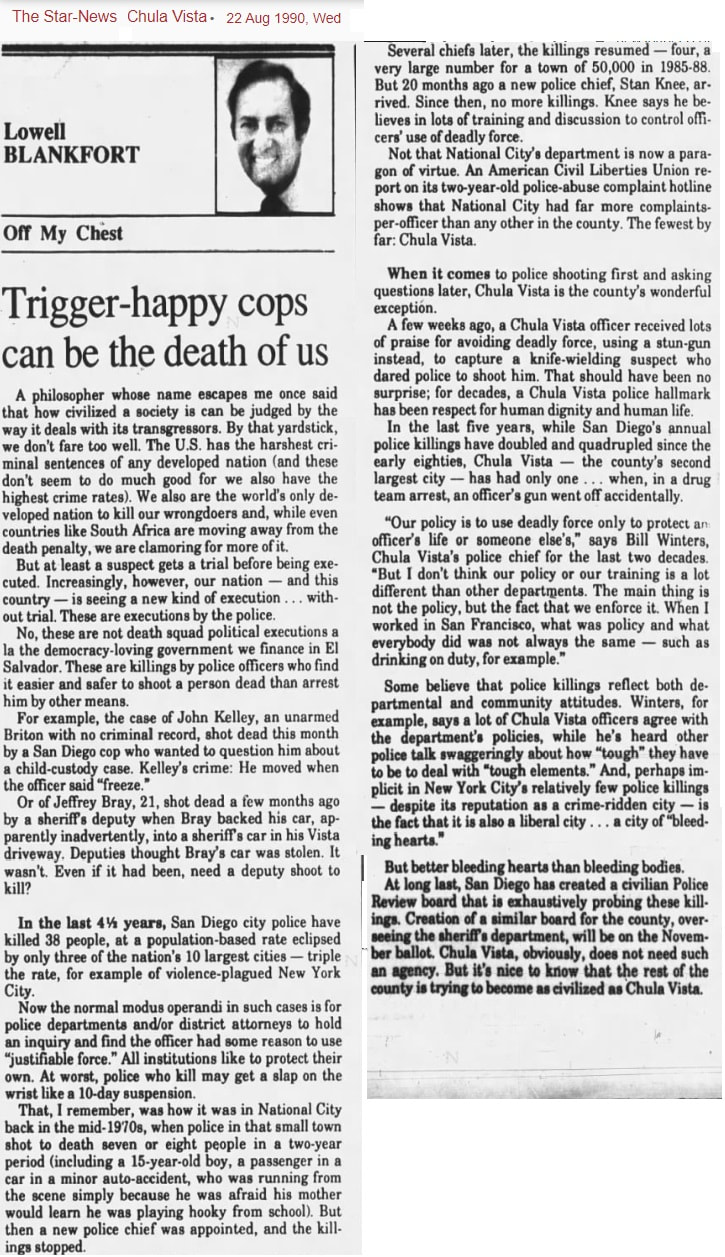22 Aug 1990
Lowell Blankfort
Off My Chest
A philosopher whose name escapes me once said that how civilized a society is can be judged by the way it deals with its transgressors. By that yardstick, we don't fare too well. The U. S. Has the harshest criminal sentences of any developed nation (and these don't seem to do much good for we also have the highest crime rates). We also are the world's only developed nation to kill our wrongdoers and, while even countries like South Africa are moving away from the death penalty, we are clamoring for more of it.
But at least a suspect gets a trial before being executed. Increasingly, however, our nation - and this country - is seeing a new kind of execution ... without trial. These are executions by the police.
No, these are not death squad political executions a la the democracy-loving govenerment we finance in El Salvador. These are killings by police officers who find it easier and safer to shoot a person dead than arrest him by other means.
For example, the case of John Kelley, an unarmed Briton with no criminal record, shot dead this month by a San Diego cop who wanted to question him about a child-custody case. Kelley's crime: He moveed when the officer said "freeze."
Or of Jeffrey Bray, 21, shot dead a few months ago by a sheriff's deputy when Bray backed his car, apparently inadvertently, into a sheriff's car in his Vista driveway. Deputies thought Bray's car was stolen. It wasn't. Even if it had been, need a deputy shoot to kill?
In the last 4 1/2 years, San Diego city police have kiled 38 people, at a population-based rate eclipsed by only three of the nation's 10 largest cities - triple the rate, for example of the violence-plagued New York City.
Now the normal modus operandi in such cases is for police departments and/or district attorneys to hold an inquiry and find the officer had some reason to use "justifiable force." All unstitutions like to protect their own. At worst, police who kill may get a slap on the wrist like a 10-day suspension.
That, I remember, was how it was in National City back in the mid-1970s, when police in that small town shot to death seven or right people in a two-year period (including a 15 year old boy, a passenger in a minor auto-accident, who was running from the scene simply because he was afraid of his mother would learn he was playing hooky from school). But then a new poliece chief was appointed, ad the killings stopped.
Several chiefs later, the killings resumed - four, a very large number for a town of 50,000 in 1985-88. But 20 months ago a new police chief, Stan Knee, arrived. Since then, no more killings. Knee says he believes in lots of training and discussion to control officers' use of deadly force.
Not that National City's department is now a paragon of virtue. An American Civil Liberties Union report on its two year old police abuse complaint hotline shows that National City had far more complaints-per-officer than any other in the county. The fewest by far: Chula Vista.
When it comes to police shooting first and asking questions later, Chula Vista is the county's wonderful exception.
A few weeks ago, a Chula Vista officer received lots of praise for avoiding dealy force, using a stun-gun instead, to caputre a knife-wielding suspect who dared police to shoot him. That should have been no surprise; for decades, a Chula Vista police hallmark has been respoect for human dignity and human life.
In the last five years, while San Diego's annual police killings have doubled and quadrupled since the early eighties, Chula Vista - the county's second largest city - has had only one ... when, in a drug team arrest, an officer's gun went off accidentally.
"Our policy is to use deadly force only to protect an officer's life or someone else's," says Bill Winters, Chula Vista's police chief for the last two decades. "But I don't think our policy or our training is a lot different thatn other departments. The main think is not the policy, but the fact taht we enforce it. When I worked for San Francisco, what was policy and what everybody did was not always the same - such as driniing on duty, for example."
Some believe that police killings reflect both departmental and community attitudes. Winters, for example, says a lot of Chula Vista officers agree with the departmetn's policies, while he's heard other police talk swaggeringly about how "tough" they have to be to deal with "tough elements." And, perhaps implicit in New Yok City;'s relatively few police killings - despite its reputation as a crime-ridden city - is the fact that it is also a liberal city ... a city of "bleeding hearts."
But better bleeding hearts than bleeding bodies. At long last, San Diego has created a civilian Police Review board that is exhaustively probing these killings. Creation of a similar board for the county, overseeing the sheriff's department, will be on the November ballot. Chula Vista, obviously, does not need such an agency. But it's nice to know that the rest of the county is trying to become as civilized as Chula Vista.

 RSS Feed
RSS Feed